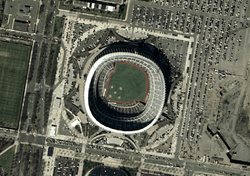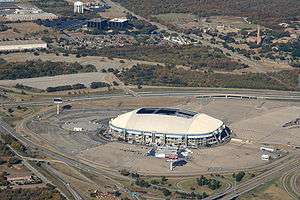Bounty Bowl
The Bounty Bowl was the name given to two NFL games held in 1989 between the Philadelphia Eagles and Dallas Cowboys. The first, a 1989 Thanksgiving Day game in Dallas, was noted for allegations that the Eagles put a $200 bounty on Cowboys kicker Luis Zendejas, who had been cut by Philadelphia earlier that season. The second was a rematch held two weeks later in Philadelphia. The Eagles, favored to win both games, swept the series.
Bounty Bowl I: The 1989 Thanksgiving Classic
|
Texas Stadium, the site of the game | |||||||||||||||||||
| |||||||||||||||||||
| |||||||||||||||||||
| Date | November 23, 1989 | ||||||||||||||||||
|---|---|---|---|---|---|---|---|---|---|---|---|---|---|---|---|---|---|---|---|
| Stadium | Texas Stadium, Irving, Texas | ||||||||||||||||||
| Favorite | Philadelphia −17 | ||||||||||||||||||
| Referee | Gene Barth | ||||||||||||||||||
| TV in the United States | |||||||||||||||||||
| Network | CBS | ||||||||||||||||||
| Announcers | Pat Summerall and John Madden | ||||||||||||||||||
The Cowboys/Eagles rivalry had been increasingly heated since the 1987 season, with Buddy Ryan arriving as the Eagles' head coach; that year, during the NFL players' strike, the Cowboys (who were playing with a number of players that crossed picket lines) routed an Eagles squad filled with replacement players;[1] Ryan, believing that the Cowboys had run up the score in poor form, responded in kind in the second game when the strike was over.[2] After the 1988 season, the Cowboys were sold to Jerry Jones, who proceeded to gut the team and fire longtime head coach Tom Landry in preparation for rebuilding.
On November 23, 1989, the Philadelphia Eagles defeated the Dallas Cowboys 27–0. Following the game, which was broadcast on CBS, Cowboys head coach Jimmy Johnson alleged that Ryan had taken out a bounty on two of the former's players, kicker Luis Zendejas and quarterback Troy Aikman:[3]
| “ | I have absolutely no respect for the way they played the game, I would have said something to Buddy, but he wouldn't stand on the field long enough. He put his big, fat rear end into the dressing room. | ” |
Ryan denied the bounty accusation, saying that film of the game "show that Small had no intention of hurting Zendejas."[4] The Philadelphia coach asserted it would have been in the Eagles' best interests to keep Zendejas in the game because he was in a slump.[4] Ryan also joked about Johnson's accusations:[4]
| “ | I resent that. I've been on a diet, I lost a couple of pounds, and I thought I was looking good. | ” |
When the Cowboys and Eagles met on Thanksgiving 25 years later, on November 27, 2014, Johnson joked that Ryan put up the bounty offer to keep his players interested since the Cowboys, who ultimately went 1-15, were so bad that year.[5]
Zendejas claimed that while he was with the Eagles, another player had received $100 for each of two hits on a punter and kicker.[6] This set of events set the stage for the scheduled rematch two weeks later in Philadelphia, dubbed "Bounty Bowl II."
Bounty Bowl II
 Veterans Stadium, the site of the game | |||||||||||||||||||
| |||||||||||||||||||
| |||||||||||||||||||
| Date | December 10, 1989 | ||||||||||||||||||
|---|---|---|---|---|---|---|---|---|---|---|---|---|---|---|---|---|---|---|---|
| Stadium | Veterans Stadium, Philadelphia, Pennsylvania | ||||||||||||||||||
| Favorite | Philadelphia −17 | ||||||||||||||||||
| Referee | Jerry Seeman | ||||||||||||||||||
| TV in the United States | |||||||||||||||||||
| Network | CBS | ||||||||||||||||||
| Announcers | Verne Lundquist and Terry Bradshaw | ||||||||||||||||||
The second game in the series took place on December 10, 1989, with NFL commissioner Paul Tagliabue in attendance. The game was anticipated as a media event. CBS Sports did a pre-game opening touting the contest as "Bounty Bowl II", complete with wanted posters, the involved players' pictures, and bounty amounts.
During the game, Eagles' fans threw snowballs, ice, and beer onto the field. Several game participants were targeted, including back judge Al Jury and Cowboys punter Mike Saxon (both struck by snowballs), as well as Cowboys coach Jimmy Johnson, who was hit with objects as he was escorted off the field by the Philadelphia Police Department. Television announcers Verne Lundquist and Terry Bradshaw were also pelted with snowballs – Lundquist would claim on-air that a recent dental surgery had been less unpleasant than broadcasting a game in Philadelphia[7] – and Eagles defensive lineman Jerome Brown was struck while standing on the sideline asking fans to cease throwing things.
Future Pennsylvania governor and Eagles fan Edward Rendell later admitted that he was involved in the incident. The then-former Philadelphia district attorney and future mayor of Philadelphia and governor of Pennsylvania bet another fan $20 that the latter couldn't reach the field with a snowball; Rendell lost.[8]
The Eagles won the game 20–10. As a result of the incident, the Eagles added security and banned beer sales for their last home game of the year against the Phoenix Cardinals and the subsequent NFC wild-card playoff game versus the Los Angeles Rams.
Aftermath
Porkchop Bowl
A third game in the heated rivalry took place the next season, known as the "Porkchop Bowl." Philadelphia won this game as well, 21–20. The Eagles did not play another Thanksgiving game until the 2008 NFL season.
Further Coverage
In 2008 and on April 11, 2010, the game was included on a list of the ten most memorable moments in the history of Texas Stadium by ESPN.[9]
See also
References
- ↑ "Pro Football: Ryan Gets Revenge in the End". Los Angeles Times. October 26, 1987. Retrieved April 4, 2010.
- ↑ "He's sure no Buddy to the Cowboys". Eugene Register-Guard. October 27, 1987. Retrieved April 4, 2010.
- ↑ https://www.youtube.com/watch?v=uOW9oYaSQdg
- 1 2 3 Kawakami, Tim (November 25, 1989). "Despite Investigation, Buddy's Humor Bountiful". Philadelphia Daily News.
- ↑ Jimmy Johnson mentioned in the first segment of Fox NFL Sunday on November 27, 2014. Johnson was an analyst on the show at the time.
- ↑ Anderson, Dave (November 26, 1989). "Sports of The Times; The Backfire From Buddy Ryan's 'Bounties'". The New York Times.
- ↑ 1989 Bounty Bowl II. YouTube.
- ↑ "Meet Ed Rendell: New Governor Led Philly Comeback". Philadelphia: WTAE Pittsburgh, ThePittsburghChannel. November 5, 2002. Archived from the original on November 7, 2002.
- ↑ Luksa, Frank (September 15, 2008). "Legends, underdogs, goats shared Texas Stadium spotlight: Texas Stadium is entering its 37th and final season. Before its hole in the roof is turned into a hole in the ground, Frank Luksa recalls the 10 most memorable games in the stadium's history". ESPN.com.
